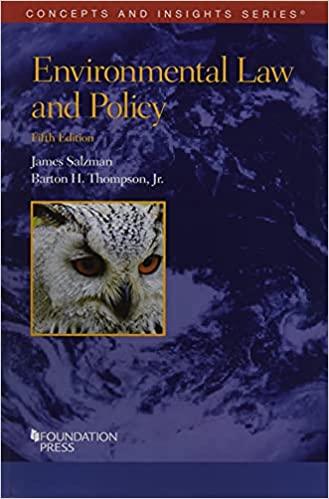Question
OBJECTIVE: Application of administrative law principles, stakeholder theory, shareholder primacy, the business judgment rule or corporate personhood for public comment on a proposed federal rule.
OBJECTIVE: Application of administrative law principles, stakeholder theory, shareholder primacy, the business judgment rule or corporate personhood for public comment on a proposed federal rule.
First, Read at least the Introduction of the Proposed Rule from the Securities Exchange Commission ("SEC") entitled "the Enhancement and Standardization of Climate-Related Disclosures for Investors(Links to an external site.)". https://www.federalregister.gov/documents/2022/04/11/2022-06342/the-enhancement-and-standardization-of-climate-related-disclosures-for-investors#addresses The official public comment period for this proposed rule lasts until May 22, 2022.
Second, using materials on the modules page, your own research or your own education and experience, draft a "public comment" regarding any aspect of this proposed rule or the rule as a whole. Please be certain to include citations to any of your research or news articles you may consult. Your public comment may be submitted on Canvas by text entry or uploading a Word or pdf document. You are encouraged to also submit your public comment to the SEC by either: Using the Commission's internet comment form ( https://www.sec.gov/rules/submitcomments.htm ).; or Sending an email to <..s@sec.gov. Please include File Number S7-10-22 on the subject line.
In your public comment, please be sure to, at a minimum, provide your own responses to the following questions.
1. What is the process that you are engaging in by writing a public comment on a proposed legislative rule and from what federal statute does this required process come?
2. What are the enabling statutes that the SEC cites for its authority to propose this rule? With the proposed rule's nexus to climate change and green house gas emissions, is there any other agency that has regulatory authority? Which federal agency or agencies is/are the best suited to regulate these matters and why?
3. Looking at Dodge v. Ford, in what ways does this proposed rule preserve the idea of "shareholder primacy"? In what ways does this proposed rule incorporate "stakeholder theory"? Does shareholder primacy or does stakeholder theory predominate the proposed rule? Which, in your view, should predominate for corporate decision-making?
4. Does this proposed rule restrict the rights or autonomies of corporate persons or does this proposed rule expand the role of corporate persons? Is this a helpful or harmful outcome and to whom?
Step by Step Solution
There are 3 Steps involved in it
Step: 1

Get Instant Access to Expert-Tailored Solutions
See step-by-step solutions with expert insights and AI powered tools for academic success
Step: 2

Step: 3

Ace Your Homework with AI
Get the answers you need in no time with our AI-driven, step-by-step assistance
Get Started


